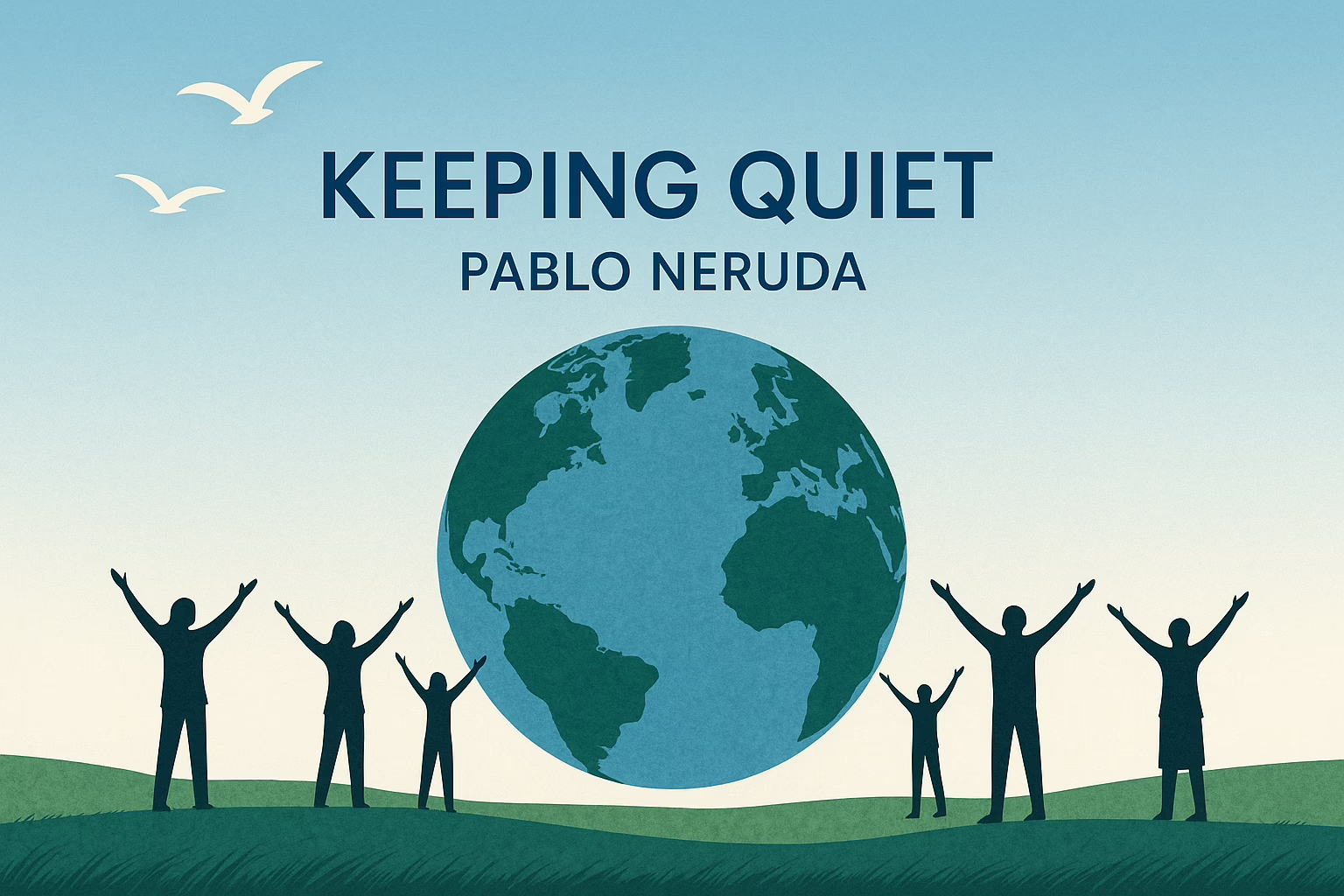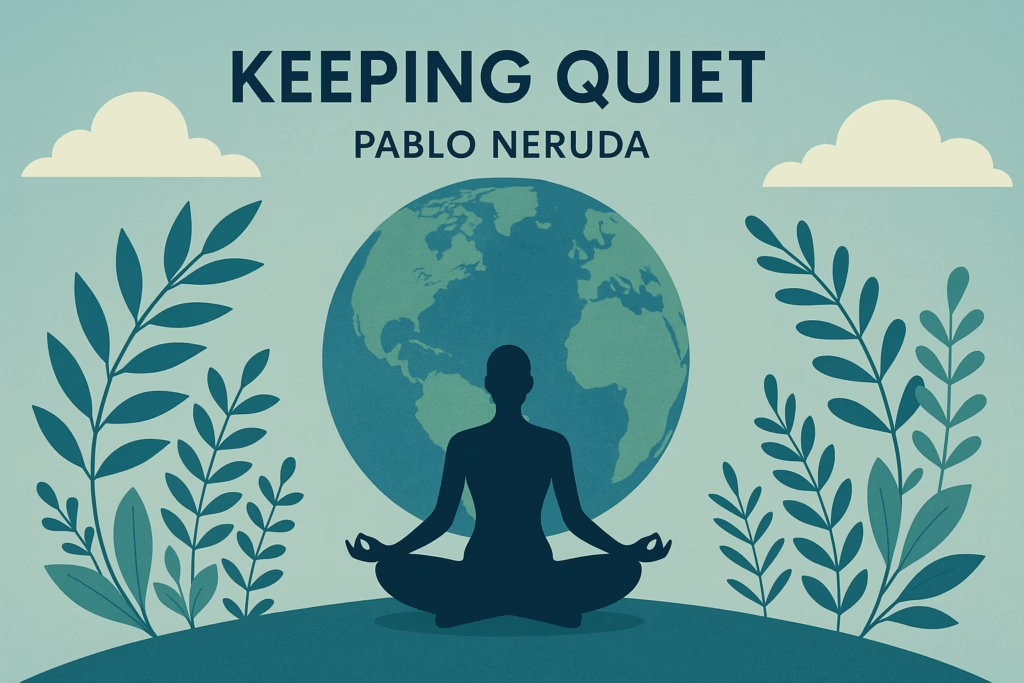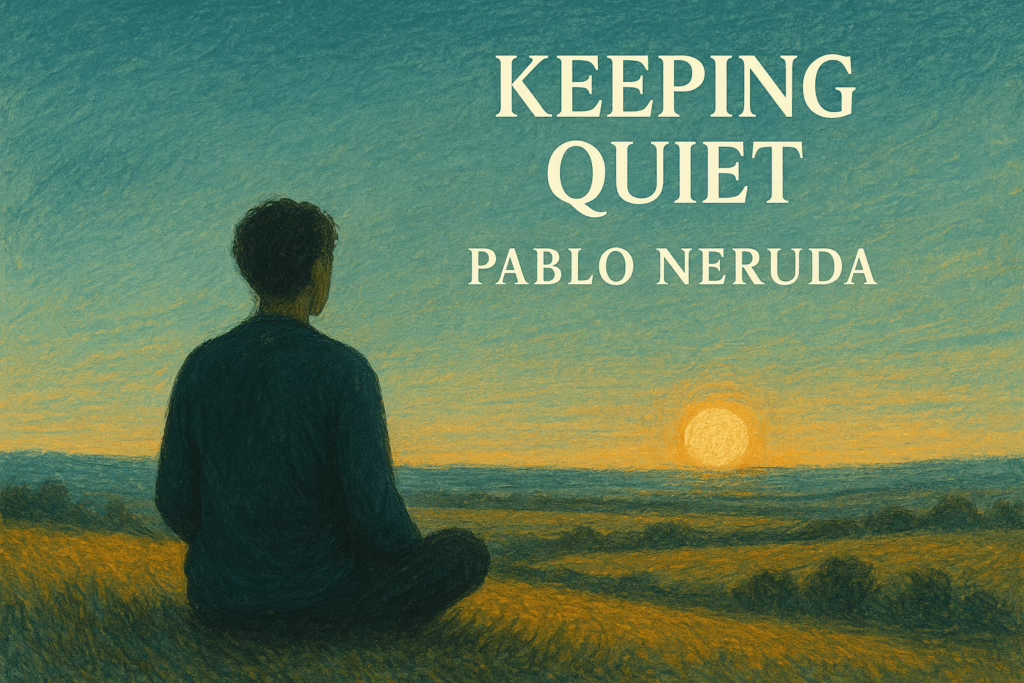Pablo Neruda’s Keeping Quiet is a rare poem that invites readers not to act, but to pause. In a world driven by noise, speed, and relentless activity, Neruda proposes a moment of stillness—an act so simple that it becomes revolutionary. Through gentle yet compelling imagery, the poem urges humanity to step back from its self-destructive habits and rediscover the value of introspection, unity, and peace.
Because each line carries a distinct layer of meaning, an expression-wise analysis helps reveal how Neruda transforms silence into a powerful metaphor for self-understanding and global harmony. By examining the poem phrase by phrase, we uncover not only its philosophical depth but also the poet’s compassionate call for a more mindful and humane world. This article presents a detailed breakdown of the poem’s expressions to illuminate the subtle nuances that make Keeping Quiet one of Neruda’s most profound and universally resonant works.

Analysis of “Keeping Quiet”
1. “Now we will count to twelve / and we will all keep still.”
- The poet suggests a simple, symbolic act—counting to twelve (the hours of a clock, months of a year, or a universal number).
- “Keep still” means pausing all activity, both physical and mental.
- This marks the beginning of global silence and introspection.
2. “For once on the face of the Earth / let’s not speak in any language,”
- He asks everyone to stop speaking, regardless of language.
- It implies breaking barriers of nationality, culture, and politics.
- Silence becomes a tool for universal unity.
3. “let’s stop for one second, / and not move our arms so much.”
- Emphasizes even a brief pause—just “one second.”
- “Not move our arms so much” symbolizes ceasing restless, destructive actions.
- Reflects how humans are constantly in hurried motion.
4. “It would be an exotic moment / without rush, without engines,”
- “Exotic” means rare, unusual, unfamiliar.
- A world without rushing or machine noise would be strangely peaceful.
- Neruda highlights how modern life is dominated by speed and mechanical activity.
5. “we would all be together / in a sudden strangeness.”
- Stillness would unite all humans, creating a sense of global togetherness.
- The experience would feel “strange” because humanity is unused to silence.
- Suggests that unity itself has become foreign to us.

6. “Fishermen in the cold sea / would not harm whales”
- The poet imagines a moment when even harmful activities stop.
- Fishermen pausing means nature gets relief from exploitation.
- Symbolic of ending violence against the environment.
7. “and the man gathering salt / would look at his hurt hands.”
- Hard-working labourers would finally notice their own suffering.
- Suggests that constant work makes people ignore their own pain.
- Silence gives space for self-awareness and healing.
8. “Those who prepare green wars, / wars with gas, wars with fire,”
- “Green wars” = wars against nature (deforestation, pollution).
- Also refers to military wars involving gas and fire.
- Points to human-made destruction on every level.
9. “victory with no survivors,”
- A chilling reminder of modern war where even victory means death for all.
- Critiques humanity’s obsession with destructive triumph.
10. “would put on clean clothes / and walk about with their brothers / in the shade, doing nothing.”
- Violent people would abandon their destructive roles.
- “Clean clothes” represent purity, peace, renewal.
- They would treat others as “brothers.”
- “Doing nothing” is symbolic of abandoning harmful actions.
11. “What I want should not be confused / with total inactivity.”
- The poet clarifies that he isn’t promoting paralysis or death.
- This stillness is not rejection of life.

12. “Life is what it is about; / I want no truck with death.”
- Neruda affirms life.
- “No truck with death” means he refuses to associate with the idea of death or nihilism.
- Stillness is meant to renew life, not destroy it.
13. “If we were not so single-minded / about keeping our lives moving,”
- Humans are obsessed with constant progress, productivity, and activity.
- This narrow-minded pursuit prevents self-reflection.
14. “and for once could do nothing,”
- Doing nothing is not laziness here; it means pausing harmful, mindless routines.
- A pause could change human consciousness.
15. “perhaps a huge silence / might interrupt this sadness”
- Silence becomes a healing force.
- “Sadness” refers to modern psychological emptiness caused by rushing and destruction.
16. “of never understanding ourselves / and of threatening ourselves with death.”
- Humans neither understand their purpose nor recognise how they destroy themselves.
- The sadness comes from lack of self-awareness and constant violence.
17. “Perhaps the Earth can teach us / as when everything seems dead / and later proves to be alive.”
- Nature teaches renewal.
- In winter the Earth looks dead, but life returns in spring.
- Suggests stillness is not death; it is preparation for renewal.
18. “Now I’ll count up to twelve / and you keep quiet and I will go.”
- The poet gently ends his message.
- Counting to twelve again reinforces the symbolic pause.
- “I will go” suggests his role is done; the responsibility now rests with humanity.

Through an expression-wise exploration of Keeping Quiet, the profound simplicity of Neruda’s message becomes unmistakably clear. Each line of the poem serves as a gentle reminder that silence is not emptiness, nor is stillness a retreat from life. Instead, Neruda frames quietness as a doorway to deeper awareness—of ourselves, of others, and of the delicate world we inhabit. The poem’s imagery, from wounded hands to halted wars, reveals how desperately humanity needs a moment of pause to confront its own restlessness and self-inflicted suffering.
By inviting the world to “count to twelve,” Neruda offers a symbolic yet transformative gesture: a brief suspension of noise, movement, and conflict in favour of reflection and unity. The detailed analysis shows how each expression contributes to this vision of peace—not as a passive state, but as an active choice to live more consciously. Ultimately, Keeping Quiet leaves readers with a timeless insight: in the quiet we avoid, we may discover the understanding, renewal, and compassion we have been missing all along.



